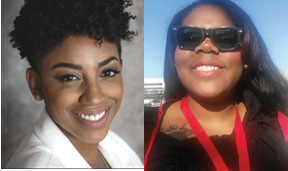 Leaders of the New School: Young women fighting HIV/AIDS
Leaders of the New School: Young women fighting HIV/AIDS
Solita Jeffries, Community Health Educator, Gaston County Health Department, MecklenburgCounty Health Department
D’Metris Welters, Grants & Events Specialist, NAESM, Inc., in Atlanta
There’s a new generation of leaders taking the reins in the fight against HIV/AIDS, and they are passionate, focused and young. They’re also women. As the HIV/AIDS pandemic hits its 36th birthday, young sisters are grabbing the torch and not looking back. And we’re ready for them.
We caught up with two of those budding activists—D’Metris Welters, 28, a grants-and-events specialist at NAESM (National AIDS Education & Services for Minorities) in Atlanta; and Solita Jefferies, 27, from Charlotte, N.C., a patient navigator for Mecklenburg County Public Health—to talk about how they see women’s roles in the HIV/AIDS epidemic and how they are making an impact in the field.
What made you decide to get involved in HIV/AIDS?
Solita Jefferies: The more I learned about the virus and those it impacted, I saw myself. Ten years ago the focus was not on MSM but on socioeconomic status and ethnic groups. They were talking about me, my neighborhood, my family, so I felt very connected to the cause. It made me want to learn more. After I had a wealth of information, I felt a responsibility for sharing that.
D’Metris Welters: I remember being at the doctor’s office with my favorite aunt at age 7 and her telling me, “Baby I have AIDS.” Then, in college, I saw a presentation by the regional minority AIDS coordinator in the area, and the way she talked frankly about sexual health made me decide what I want to do with my life. I changed my major from premed to health education and behavior, and I became engulfed in studying HIV, sexual health and sexual identity. That presentation and my aunt’s admission had major impacts on me.
How do you see the role of younger women in ending the HIV/AIDS epidemic?
SJ: In communities of color, women naturally have a matriarchal, nurturing presence. It’s in my DNA to be a gate-keeper of information for the communities that I am a part of and the communities that I am invited to be a part of. The gay community has invited me into their space, and I feel a huge level of responsibility to share what I know with them and help them make informed, responsible decisions.
DW: Women are naturally the keepers of the house and the family, so I think that a woman is awnatural fit anywhere. We pay the extra attention to detail when it comes to our clients and how they’re feeling. Working alongside Black gay men, we have a different perspective because we’re not in that population. So if Tom doesn’t want to talk to Bob because the Atlanta community is small and Bob knows Bill and John, then Tom may feel more comfortable talking to me because I am not part of that circle.
When it comes to the disease, are there enough resources for Black women?
SJ: There aren’t adequate resources. The message of prevention and treatment for Black women has not caught up to the present day. I’m not minimizing the work that was done before or the importance and efficacy of it, but in 2017 we don’t employ innovative efforts in reaching the female populations in the same way we attempt to do for other populations.
DW: Just like HIV is an evolving virus, the paradigm is forever shifting. When I started, the focus was on White gay males and then Black people. But it wasn’t specifically targeted to Black women or Black gay men—even though their stats were high. Now, as the paradigm has shifted towards Black gay men, Black women are once again in the background. We need to put more effort into prevention for women because if the disease can be prevented, then we don’t have to talk about how it needs to be treated.
How does the HIV/AIDS movement relate to Black Lives Matter and other racial- and social-justice work that your peers are engaged in?
DW: There’s an interconnectedness between HIV and other social factors like socioeconomic status, education level, poverty, mental health and substance abuse. We know that Black people constitute 13 percent of the U.S. population; however, we constitute 40 percent of new infections. So let’s talk about all Black lives: Let’s talk about poor Black lives; let’s talk about rich Black lives; let’s talk about those with HIV, diabetes, cancer. You can’t speak of one without speaking of the other.
SJ: At my core I’m a social-justice advocate. In every space that I’m invited to, I use my voice for those who aren’t invited into such spaces. My peers and I have to do more than post on social media or put slogans on T-shirts. We have to do work and know how decisions are made in our communities and then become part of those processes. Not just to be reactionary, but to be productive.
LaShieka Hunter is a freelance writer and editor based on Long Island, N.Y.
